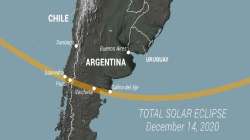Solar Eclipse 2020: When and where to watch live streaming of last Surya Grahan of the year
Some parts of the world are set to witness the last solar eclipse of the year, as the celestial event is set to adorn the skies on Monday, December 14. However, the eclipse will not be visible in India this time around, as it will begin when the Sun has already set, at 7:03 p.m. IST on December 14, and end at 12:23 a.m. IST on December 15.

The last solar eclipse of 2020 is just around the corner. The solar eclipse takes place when the moon passes between the sun and the earth and blocks out the sun. Some parts of the world are set to witness the last solar eclipse of the year, as the celestial event is set to adorn the skies on Monday, December 14. However, the eclipse will not be visible in India this time around, as it will begin when the Sun has already set, at 7:03 p.m. IST on December 14, and end at 12:23 a.m. IST on December 15. The time of the maximum eclipse is noted to be at 9:43 p.m. IST.
Solar Eclipse 2020 will be visible in these places
The total Solar Eclipse will only be visible in parts of Chile and Argentina in South America. The partial eclipse will be visible from the Pacific Ocean, Antarctica, and southern parts of South America.
The best cities to view the partial solar eclipse from would be Santiago (Chile), São Paulo (Brazil), Buenos Aires (Argentina), Lima (Peru), Montevideo (Uruguay), and Asuncion (Paraguay).
Solar Eclipse 2020 Date and time
Monday, December 14
Surya Grahan will start at 7:03 pm (IST) and end at 12:23 am (IST) on December 15.
The time of maximum eclipse is at 9:43 p.m. (IST)
Solar Eclipse 2020: How can you watch it?
NASA will be broadcasting the eclipse, with camera views from Chile beginning at 9:40 a.m. EST (1440 GMT). At 10:30 a.m. EST (1530 GMT), NASA will begin a narrated program for the event in Spanish. Both will be available to watch at Space.com courtesy of NASA or directly through the agency's website.
What is a total solar eclipse?
A total solar eclipse occurs when the Moon comes between the Sun and Earth and casts its shadow on our home planet. A shadow is composed of two components—a dark inner circle where all of the sunlight is blocked, called the umbra; and an outer zone of the shadow that blocks only part of sunlight, called the penumbra.
During a total eclipse of the Sun, the Moon covers the entire solar disk, while in partial and annular solar eclipses, the Moon blocks only a part of the Sun.
This upcoming eclipse will be of 1.02 magnitude, which means at the time of the maximum eclipse, the Sun will be completely hidden by the shadow of the Moon. This ‘totality’ is expected to last for 2 minutes, 10 seconds.